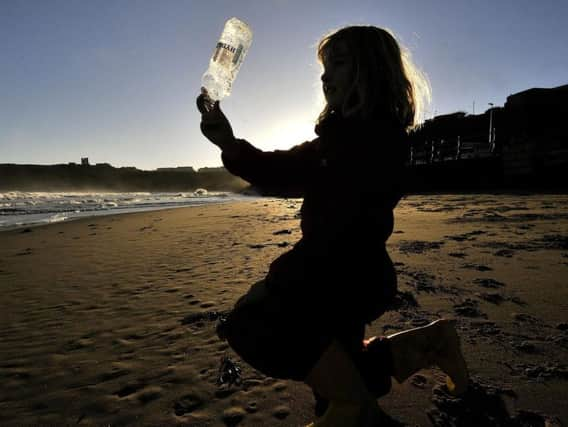We must do our bit to save the oceans from plastic pollution


Junior Gazette reporter Becky Fuller looks at the growing crisis of plastic pollution...
Plastic. One of the main materials used for the production and packaging of finished goods. The material we all thought would do the world a miracle; we were definitely wrong there!
Advertisement
Hide AdAdvertisement
Hide AdPlastic is polluting our world every second of every day and only a handful of the world’s population is doing something to change that. Are you?
Every day, approximately eight million pieces of plastic pollution finds its way into the oceans, ready to injure or even kill marine wildlife.
The Great Pacific Garbage Patch
The Great Pacific Garbage Patch is a gyre- a slowly swirling whirlpool of ocean currents that collects plastic debris. It is estimated to be twice the size of France; keep in mind that France has an area of 643,801km² which would make this gyre pretty big.
The oceanographer who discovered it says that it will double in size over the next 10 years if
Advertisement
Hide AdAdvertisement
Hide Adwe don’t take action immediately. That means it would be about the same size as Algeria!
Plastic's undesired lifespan
The most durable plastics, such as nappies, plastic bottles and beer holders, can take up
to 450 years to decompose. This is over 5 times the average life expectancy of a British
person. Imagine all the pollution one piece of plastic can make in 450 years and
Advertisement
Hide AdAdvertisement
Hide Admultiply that by 8 million. It’s insane. We need to take action now or Earth could
eventually become a planet with every inch covered in plastic.
Animals- the victims
One of the main risks that plastic being in the ocean can cause injuries or fatalities to
animals. They can become entangled in plastic, ingest it, use it to build nests and cause
species to become invasive.
Advertisement
Hide AdAdvertisement
Hide AdEntanglement- entanglement is when animals get themselves tangled in plastic, such
as discarded fishing lines, beer holders and plastic rugs.
Ingestion- this is when animals mistakenly, or sometimes intentionally, ingest pieces
of plastic.
Invasive Species- this is when a marine species is able to travel from one part on the
world to another, not by natural migration. They can climb onto pieces of plastic which
Advertisement
Hide AdAdvertisement
Hide Adget caught in currents. These pieces of plastic can travel all around the world; this can
cause problems as some species can migrate to different locations and spread diseases
to other animals who don’t have any defenses. This has happened between the
American Signal crayfish, which has had some of its species has moved to Britain, and the British White Clawed crayfish, which its number of its species left is now
decreasing.
WHAT CAN YOU DO?
1. Stop buying bottled water
2. Buy reusable products e.g. reusable bags
3. Buy second hand products e.g. a phone
4. RECYCLE
5. Support a bag tax/ban
6. Use refillable products e.g. soap dispensers
7. Download music from the internet instead of buying CDs
8. Seek out items that aren’t made of plastic
9. Use silverware instead of plastic utensils
10. Buy in bulk e.g. tubs of yoghurt not separate pots